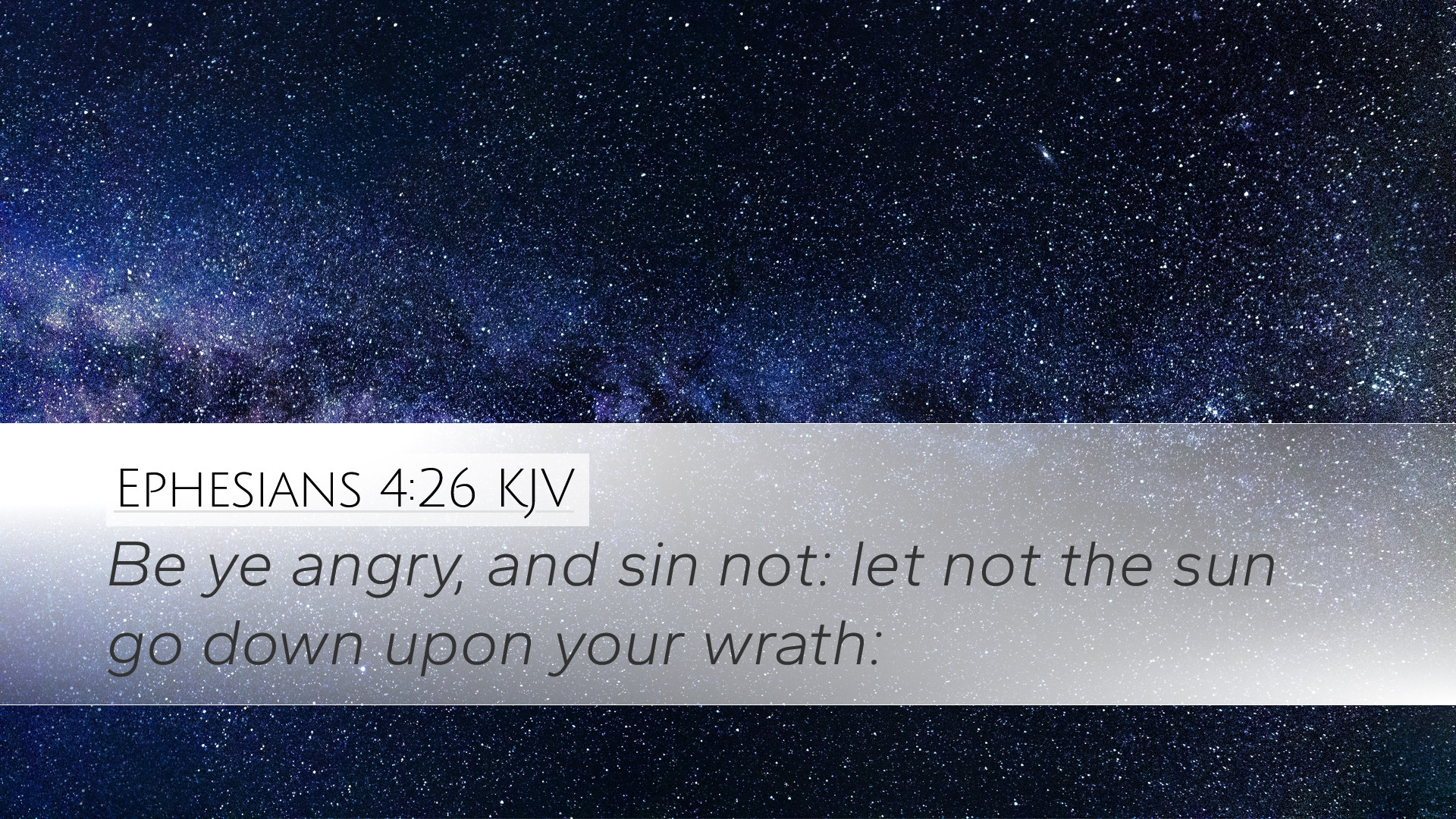Ephesians 4:26 Commentary
Verse Text: "Be angry, and do not sin: do not let the sun go down on your wrath."
Introduction
The apostle Paul, in his epistle to the Ephesians, addresses the Christian community about the importance of unity, holiness, and practical godliness. Ephesians 4:26 holds a significant position in this exhortation by addressing the emotion of anger, which is common to humanity, and its proper management within the context of Christian living.
Exegesis of the Verse
This verse opens with a direct exhortation: "Be angry." This imperative suggests that anger is not inherently sinful; rather, it is a natural human emotion. However, the latter part of the verse - "and do not sin" - introduces the critical caution that accompanies the expression of anger.
Paul follows with a practical admonition: "do not let the sun go down on your wrath." This phrase emphasizes the importance of resolving conflicts and personal grievances swiftly to prevent the festering of unresolved anger.
The Nature of Anger
Anger can be seen as a response to injustice and a signal that something is wrong. Matthew Henry, in his commentary, notes that anger can be lawful if it arises from a righteous cause. However, he warns that uncontrolled anger leads to sin, which includes bitterness, resentment, and vengeance.
Adam Clarke adds that anger, when directed toward a just cause, can serve as a motivation towards effecting positive change. It becomes detrimental, however, when it turns inward (against oneself) or outward (against others) in a way that violates love and compassion.
The Dangers of Unresolved Anger
Albert Barnes points out the peril of harboring unresolved anger. This sentiment is well captured in the phrase about the sun going down on one's wrath. He notes that allowing anger to linger can lead to a soul being consumed by bitterness, which eventually results in sinful attitudes and actions.
Henry mentions the importance of timeliness in reconciliation, suggesting that unresolved anger can escalate into greater conflicts. By urging believers to resolve their conflicts before day’s end, Paul emphasizes the imperative of maintaining relational harmony in the body of Christ.
Practical Applications for Believers
In light of this verse, a few practical applications emerge:
- Self-Examination: Believers should regularly assess their emotions and identify the root causes of their anger.
- Immediate Resolution: One must aim to address grievances swiftly to maintain peace and unity.
- Constructive Engagement: Use anger as a motivator for change rather than as a means to inflict harm or speak ill of others.
- Prayerful Reflection: Engage in prayer when feeling anger to seek God's guidance and wisdom in handling emotional responses.
Theological Insights
Theological interpretations highlight several key concepts illustrated in this verse:
- Human Emotion and Divine Expectation: God, who experiences righteous anger, expects His people to emulate that anger without crossing into sin.
- Love and Forgiveness: Underneath the surface of anger often lies the need for love and forgiveness, reminding believers of Christ’s command to love one another.
- Community Living: The ecclesiastical implications of this verse emphasize that personal anger can disrupt communal harmony, hence the call for immediate reconciliation.
Concluding Thoughts
Ephesians 4:26 presents a rich perspective on the treatment of anger within the Christian experience. Paul does not demonize anger; rather, he acknowledges its place in human emotion while guiding believers toward a righteous response. Thus, pastors, students, and theologians are encouraged to reflect on their emotional health and to cultivate practices that promote peace, ensuring that anger, when it arises, is addressed and not allowed to fester.
Ultimately, this verse serves as both a warning and a framework for managing emotions in a manner that honors God, fosters community, and promotes spiritual growth.


